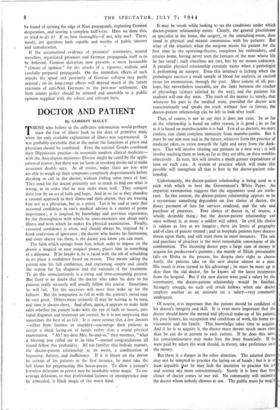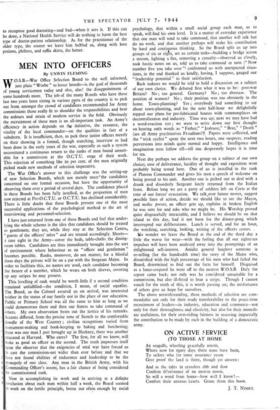DOCTOR AND PATIENT
By GORDON MALET
THOSE who believe in the collective unconscious would perhaps trace the fear of illness back to the days of• primitive man, when the only available explanation of illness was supernatural. It was probably inevitable that at the outset the functions of priest and physician should be combined. Even the rational Greeks combined their Hippocratic practice—in essentials modern clinical medicine— with the Aesculapian mysteries. Disease might be cured by the appli- cation of reason ; but there was no harm in invoking divine aid to make assurance doubly sure. At all events, today there are few who are able to weigh up their symptoms completely dispassionately before deciding to call in the doctor, without feeling some trace of fear. They send for the doctor primarily not so much to find out what is wrong, as in order that he may make them well. They conquer their fear by an act of faith and hope. And in so far as they abandon a rational approach to their illness and their doctor, they are treating him not as a physician, but as a priest. Let it be said at once that reasoned confidence in one's medical advisor is a matter of prime importance ; it is inspired by knowledge and previous experience, by the thoroughness with which he cross-examines one about one's illness and with which he makes his physical examination. Finally, reasoned confidence is often, and should always be, inspired by a frank confession of ignorance ; the doctor who knows his limitations, and every doctor has them, is the doctor you know you can trust.
The faith which springs from fear, which seeks to impose on the doctor a magical or near magical power, places him in something of a dilemma. If he breaks it, he is faced with the job of rebuilding in its place a confidence based on reason. This means taking the patient into his full confidence, and explaining simply and clearly the reason for his diagnosis and the rationale of the treatment. To do this conscientiously is a tiring and time-consuming process. But there is no doubt that the doctor who takes his duty to his patients really seriously will usually follow this course. Sometimes he will fail. Yet the successes will more than make up for the failures. But the temptation to fall in with the patient's mood may be very great. Others more seriously ill may be waiting to be seen, and time is always short. And often, again, it appears to make little odds whether the patient looks with the eye of faith or reason, pro- vided diagnosis and treatment are correct. So it is not surprising that sometimes the best of us fail. It is more serious that a few doctors —either from laziness or stupidity—encourage their patients to accept a ritual laying-on of hands rather than a sound physical examination. " Ah! my dear Mrs. So-and-so," they murmur, " what a blessing you called me in in time "—mental congratulations all round follow this profundity. All too familiar this bedside manner, the doctor-patient relationship at its worst, a combination of hypocrisy, flattery, and inefficiency. If it is thrust on the doctor by certain of his patients in the first instance, he must take the full blame for perpetuating this hocus-pocus. To allow a patient's harmless delusions to persist may be justifiable white magic. To en- courage delusions, so that professional laziness or incompetence may be concealed, is black magic of the worst kind.
It may be worth while looking to see the conditions under which doctor-patient relationship exists. Clearly, the general practitioner or specialist in the home, the surgery, or the consulting-room, doei stand in physical and mental communion with his patients. But what of the situation when the surgeon meets his patient for the first time in the operating-theatre, completes his embroidery, and returns home, having never seen the features of the man whose life he has saved ; such situations are rare, but by no means unknown. A peculiar physical relationship certainly exists when a pathologist is performing an autopsy. Even this intimacy is lacking when the pathologist receives a small sample of blood for analysis, or excised tissue for examination, through the post. Most remote of all,, per- haps, but nevertheless traceable, are the links between the teacher of physiology (always salaried by the way), and the patients his students will one day treat. The truth of the matter is, surely, that whatever his part in the medical team, provided the doctor acts conscientiously and speaks the truth without fear or favour, the doctor-patient relationship an be left to look after itself.
That, of course, is not to say that it does not exist. In so far as the relationship is based on sober reason, it is good. ; in so far as it is based on mumbo-jumbo it is bad. Few of us doctors, we must confess, can claim complete immunity from mumbo-jumbo. But it must be our aim now and in the future, whatever form the practice of medicine takes, to strive towards the light and away from the dark- ness. This will involve treating our patients in a new way ; it will involve teaching them to look, as far as they are able, on their troubles objectively. In turn, this will involve a much greater expenditure of time on each case. A system of practice which will make this possible will strengthen all that is best in the doctor-patient rela- tionship. •
Unfortunately, the doctor-patient relationship is being used as a stick with which to beat the Government's White Paper. An impartial examination suggests that the arguments used are irrele- vant. In this context, the doctor-patient relationship appears to be a mysterious something dependent on free choice of doctor, the direct payment of fees for services rendered, and the sale and
purchase of practices. Free choice of doctor is, of course, a wholly desirable thing ; but the doctor-patient relationship can exist without it, as many a soldier will admit. In civil life choice is seldom as free as we imagine ; there are limits of geography and of class of patient treated ; and in hospitals patients have doctors thrust upon them, and still trust them in most instances. The sale and purchase of practices is the most remarkable constituent of the combination. The incoming doctor pays a large sum of money to acquire his predecessor's patients ; the mantle of Elijah presumably falls on Elisha in the process, for despite their right to choose freely, the patients take on the new doctor almost to a man. His youth is even turned to his advantage ; he must be more up to date than the old doctor, for he knows all the latest treatments from the hospital. But if the new doctor were paid a salary by the community, the doctor-patient relationship would be finished. Strangely enough, no such evil result follows when one doctor employs another as an assistant on a salary—very commonly inadequate.
Of course, it is important that the patient should be confident of his doctor's integrity and skill. It is even more important that the doctor should know the mental and physical make-up of his patient, his past history, his occupation and conditions of work, his home en- vironment and his family. This knowledge takes time to acquire. And if he is to acquire it, the doctor must devote much more time than he can do at present to each patient. If he does this now, his conscientiousness may make him the loser financially. If he were paid by salary the work should, in theory, take preference over the money.
But there is a danger in the other direction. The salaried doctor h may not be tempted to practice the laying on of hands ; but it is at a least arguable 'hat he may lack the incentive to practice his art C and science any more conscientiously. Surely it is here that free IC choice of doctor comes to our aid. No community will maintain the doctor whom nobody chooses to use. The public must be taugh
to recognise good doctoring—and bad—when it sees it. If this can be done, a National Health Service will do nothing to harm the best type of doctor-patient relationship. As for the practitioner of the older type, the sooner we leave him behind us, along with love potions, philtres, and raffia skirts, the better.



























 Previous page
Previous page